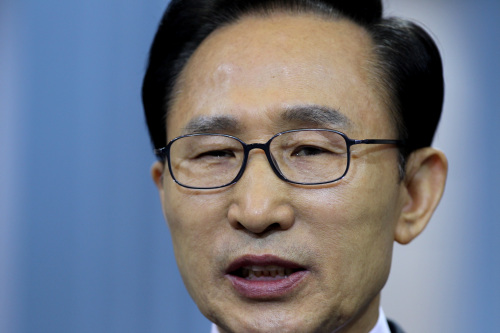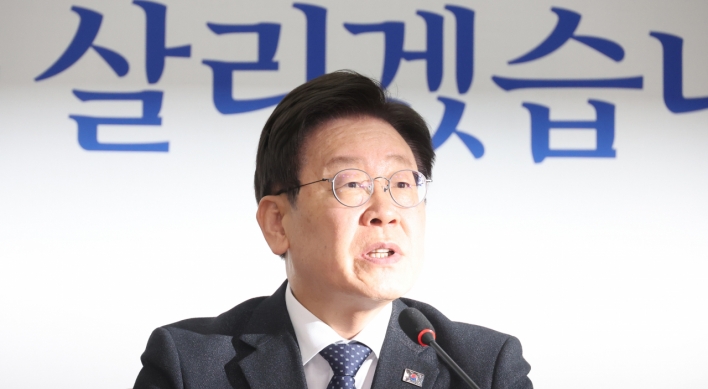President Lee presses China over North Korean defectors
By Korea HeraldPublished : Feb. 22, 2012 - 20:11
Lee apologizes for scandals involving his associates, relatives
President Lee Myung-bak on Wednesday said China should handle the issue of North Korean defectors in accordance with international humanitarian norms, raising pressure on Beijing not to repatriate them.
His remarks during a press conference held to mark the fourth anniversary of his inauguration came as Seoul has decided to appeal to the international community to address the issue, given its bilateral talks with Beijing have not been fruitful.
“As long as the defectors are not criminals, it would be right for China to deal with them according to international norms. In that regard, Seoul will cooperate with Beijing,” Lee said during the hour-long, nationally-televised conference at Cheong Wa Dae.
President Lee Myung-bak on Wednesday said China should handle the issue of North Korean defectors in accordance with international humanitarian norms, raising pressure on Beijing not to repatriate them.
His remarks during a press conference held to mark the fourth anniversary of his inauguration came as Seoul has decided to appeal to the international community to address the issue, given its bilateral talks with Beijing have not been fruitful.
“As long as the defectors are not criminals, it would be right for China to deal with them according to international norms. In that regard, Seoul will cooperate with Beijing,” Lee said during the hour-long, nationally-televised conference at Cheong Wa Dae.

Despite risks of straining ties with Beijing, Seoul has decided to raise the issue at a U.N. panel on human rights next week. With news reports of around 80 defectors facing repatriation, public calls have mounted here for more action to protect them.
Despite international entreaties and criticism for the “inhumane repatriation,” China has refused to categorize the defectors as refugees protectable by the international human rights rules, arguing they just illegally crossed the border “for economic reasons.”
During the conference, Lee also stressed “peace and stability” on the Korean Peninsula, but fell short of making any dramatic proposals to North Korea for improving bilateral ties.
“The first basic goal of the South and North is peace and stability on the peninsula. To this end, the two should engage in dialogue. Should the North be willing to talk with sincerity, we will accept it with an open mind,” he said.
“The North is now at a juncture very conducive for change for the future. Whether to grab the opportunity or not is up to the North.”
While shrugging off the North’s claim that it “would not deal with the South” as hackneyed rhetoric repeated for decades, he cautioned against the North not to seek to cause conflicts in the South to influence major elections here this year.
“It is important for the North to understand that South Korea is not that immature to be influenced by any (conflicts fomented by the North),” he said.
Lee also made apologetic comments on a recent series of corruption scandals involving his close associates and relatives.
“Those who are economically better off engaged in corruption while those who are struggling are working hard. Watching it, I myself feel (bad). How would other people feel about it? I have nothing to say to the people,” Lee said.
“When my associates are found to have been suspected of corruption, I feel very frustrated and infuriated, and toss and turn at night.”
Earlier this month, senior presidential secretary for political affairs Kim Hyo-jae offered to resign over allegations that he was involved in the ruling Saenuri Party’s 2008 vote-buying scandal.
Former Korea Communications Commission Chairman Choi See-joong, dubbed Lee’s political mentor, resigned last month amid corruption allegations involving his former aide at the commission. His elder brother Rep. Lee Sang-deuk of the ruling party is also suspected of having amassed illicit political funds.
Expressing his deep frustration over the opposition’s moves to reverse major government projects, he vowed to push ahead with them and maintain his policy principles.
“Under any circumstances, I will firmly keep my core policies where our national interests and future are at stake,” he said. “We will not do anything that will burden the next administration and our young generations.”
These remarks came as the opposition parties led by the main opposition Democratic Unified Party have threatened to scrap the Korea-U.S. free trade pact scheduled to take effect on March 15 and the projects to establish a strategic naval base on Jeju and refurbish the country’s four major rivers.
Lee particularly criticized the opposition politicians for reversing their earlier statements, highlighting that these projects were first initiated when they were in the ruling bloc.
“I don’t think these are issues that can be used politically. We should cooperate over them,” he said.
He also cautioned against the political parties churning out a series of populist pledges without consideration of the country’s financial capacity.
By Song Sang-ho (sshluck@heraldcorp.com)
Highlights of Lee’s speech
● Urges China to handle defectors in accordance with international rules
● Makes apologetic remarks over corruption scandals involving his associates
● Stresses that North Korea has an opportunity for change
● Expresses concerns over opposition’s moves to reverse government projects
● Cautions against political parties’ populist pledges ahead of April general elections
-
Articles by Korea Herald




![[Herald Interview] 'Amid aging population, Korea to invite more young professionals from overseas'](http://res.heraldm.com/phpwas/restmb_idxmake.php?idx=644&simg=/content/image/2024/04/24/20240424050844_0.jpg&u=20240424200058)







![[Hello India] Hyundai Motor vows to boost 'clean mobility' in India](http://res.heraldm.com/phpwas/restmb_idxmake.php?idx=644&simg=/content/image/2024/04/25/20240425050672_0.jpg&u=)






![[Today’s K-pop] NewJeans' single teasers release amid intrigue](http://res.heraldm.com/phpwas/restmb_idxmake.php?idx=642&simg=/content/image/2024/04/26/20240426050575_0.jpg&u=)